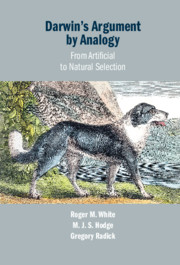Book contents
- Darwin’s Argument by Analogy
- Additional material
- Darwin’s Argument by Analogy
- Copyright page
- Contents
- Preface
- Introduction
- Chapter 1 Analogy in Classical Greece
- Chapter 2 Analogy in the Background to the Origin
- Chapter 3 Darwin’s Analogical Theorising before the Origin
- Chapter 4 The ‘One Long Argument’ of the Origin
- Chapter 5 An Analysis of Darwin’s Argument by Analogy
- Chapter 6 Darwin’s Use of Metaphor in the Origin
- Chapter 7 Rebuttals of the Revisionists
- Chapter 8 Wider Issues Concerning Darwinian Science
- References
- Index
Chapter 2 - Analogy in the Background to the Origin
Published online by Cambridge University Press: 21 October 2021
- Darwin’s Argument by Analogy
- Additional material
- Darwin’s Argument by Analogy
- Copyright page
- Contents
- Preface
- Introduction
- Chapter 1 Analogy in Classical Greece
- Chapter 2 Analogy in the Background to the Origin
- Chapter 3 Darwin’s Analogical Theorising before the Origin
- Chapter 4 The ‘One Long Argument’ of the Origin
- Chapter 5 An Analysis of Darwin’s Argument by Analogy
- Chapter 6 Darwin’s Use of Metaphor in the Origin
- Chapter 7 Rebuttals of the Revisionists
- Chapter 8 Wider Issues Concerning Darwinian Science
- References
- Index
Summary
In the decades before the Origin, a split arises between two very different concepts of analogy, and so two views of argument by analogy. Some people, taking 'analogy' as a synonym for 'similarity',came to a new understanding of 'argument by analogy': suppose A and B are known to share a number of properties, then the probability is increased that B also possesses some other property which A is known to possess. This account remains widely assumed even today. Other people, largely within Anglican theology and concerned with the analogy between God and the world, insisted that the only correct use of the word 'analogy' was in its original Greek sense, including the Aristotelian commitment to proportionality, and so to relational comparisons, as when God is related to his creatures as a human father is to his children. This commitment grounded a view radically different from the new similarity view. In analysing what an argument by analogy is, Richard Whately, and following him J. S. Mill, specified explicitly the conditions for such an argument to be valid. It is this account that is relevant to an understanding of Darwin’s use of analogy.
- Type
- Chapter
- Information
- Darwin's Argument by AnalogyFrom Artificial to Natural Selection, pp. 51 - 76Publisher: Cambridge University PressPrint publication year: 2021



